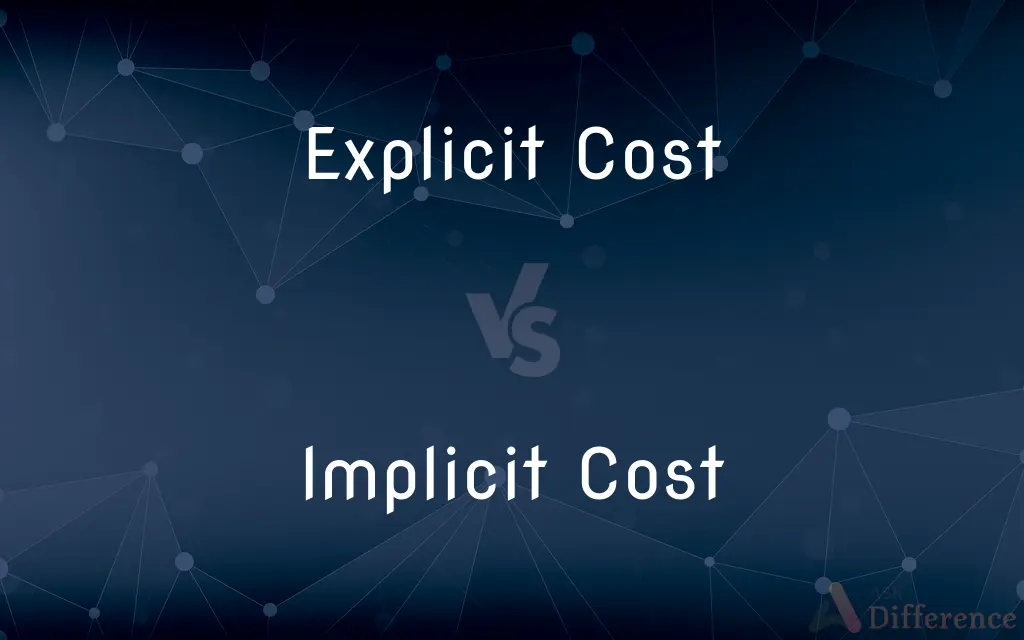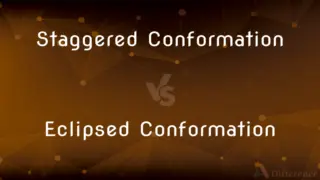Explicit Cost vs. Implicit Cost — What's the Difference?
Edited by Tayyaba Rehman — By Fiza Rafique — Published on December 13, 2023
Explicit Cost is the direct monetary outlay in business. Implicit Cost is the opportunity cost of using owned resources.

Difference Between Explicit Cost and Implicit Cost
Table of Contents
ADVERTISEMENT
Key Differences
Explicit Cost and Implicit Cost are pivotal concepts in economics, especially when assessing the overall expenses of a business. Explicit Cost refers to the tangible, direct expenses a business incurs, usually documented through invoices or receipts. Implicit Cost, conversely, represents the opportunity cost of deploying resources that the business already owns.
For instance, when a company rents an office space, the monthly rent is an Explicit Cost, since it's a direct financial outlay. On the flip side, if the business owner uses a portion of their home as an office, they might not pay rent, but there's an Implicit Cost. This Implicit Cost is the potential rent they could have earned if they'd leased that space to someone else.
A company might pay salaries to its employees, which is an Explicit Cost. However, if the owner decides not to draw a salary and instead reinvests in the business, the foregone salary becomes an Implicit Cost. It represents the income the owner could have potentially earned elsewhere.
To understand the real expense of running a business, one must consider both Explicit Cost and Implicit Cost. While Explicit Cost is straightforward and easy to quantify, Implicit Cost can be elusive but is crucial for a comprehensive financial overview.
Overall, while Explicit Cost details the tangible monetary expenses of operations, Implicit Cost captures the intangible costs associated with the potential benefits foregone by choosing one action over another.
ADVERTISEMENT
Comparison Chart
Nature
Direct monetary expense
Opportunity cost of resources
Documentation
Often documented via invoices or receipts
Not typically documented in financial statements
Example
Rent, salaries, utilities
Foregone rent, owner's potential salary
Quantifiability
Easily quantified in monetary terms
Can be challenging to quantify
Representation
Represents tangible outlays
Represents intangible or potential benefits foregone
Compare with Definitions
Explicit Cost
Tangible outlays documented in monetary terms.
The rent and utility bills contribute to the explicit cost of running the store.
Implicit Cost
The economic cost of non-purchased inputs in production.
Her decision to not lease out the extra space has an implicit cost in foregone revenue.
Explicit Cost
Monetary payments made by a business.
Employee salaries and supplier payments are significant explicit costs.
Implicit Cost
Intangible costs not involving direct monetary outlay.
Not charging rent for company premises has an implicit cost.
Explicit Cost
Financial transactions representing business expenses.
Purchasing raw materials added to the company's explicit cost.
Implicit Cost
Foregone benefits from alternative uses of resources.
The implicit cost of the owner's time could be seen in the salary he could have earned elsewhere.
Explicit Cost
Actual cash outflows incurred by a firm.
The advertising campaign had an explicit cost of $5,000.
Implicit Cost
Opportunity costs of utilizing owned assets.
By using his own vehicle, the owner faced an implicit cost in potential rental income.
Explicit Cost
Direct financial expenses in operations.
The company's explicit cost for the new equipment was $10,000.
Implicit Cost
The cost of resources already owned, without cash transaction.
The business's use of proprietary software has an implicit cost in potential licensing fees.
Common Curiosities
How would you define Implicit Cost?
Implicit Cost is the opportunity cost of using assets or resources the business already owns.
Why aren't Implicit Costs usually recorded in financial statements?
Implicit Costs are intangible and don't involve cash outflows, making them hard to document on financial statements.
What is Explicit Cost in simple terms?
Explicit Cost is the direct financial expense incurred in business operations.
Do Explicit Costs affect a company's profit?
Yes, Explicit Costs reduce a company's profit as they are direct expenses.
Is rent an Explicit Cost or Implicit Cost?
Rent paid to an external party is an Explicit Cost; foregone rent from owned property is an Implicit Cost.
What's an example of Implicit Cost in everyday life?
If you use your personal car for a trip instead of renting it out, the foregone rental income is an Implicit Cost.
Are wages an Explicit Cost?
Yes, wages paid to employees are considered an Explicit Cost.
If a business owner doesn't draw a salary, what type of cost is this?
This is an Implicit Cost, representing the income the owner forgoes.
Can both Explicit and Implicit Costs exist for the same resource?
Yes, for instance, using owned premises has an Implicit Cost (foregone rent) and Explicit Costs like maintenance.
Can Implicit Costs have real financial implications?
Yes, while not directly monetary, Implicit Costs can impact the potential earnings and value of a business.
Are all Explicit Costs documented in financial records?
Typically, yes. Explicit Costs involve monetary transactions and are usually recorded.
Are all business expenses Explicit Costs?
No, while many business expenses are Explicit Costs, some, like the value of an owner's time, can be Implicit Costs.
Which cost is more challenging to calculate?
Implicit Cost is often harder to quantify due to its intangible nature.
Why are Implicit Costs important for business decisions?
Implicit Costs reflect potential earnings or benefits; considering them gives a comprehensive view of total costs.
Is the interest paid on loans an Explicit Cost?
Yes, interest on loans is a direct financial outlay, making it an Explicit Cost.
Share Your Discovery

Previous Comparison
Fishes vs. Sharks
Next Comparison
Staggered Conformation vs. Eclipsed ConformationAuthor Spotlight
Written by
Fiza RafiqueFiza Rafique is a skilled content writer at AskDifference.com, where she meticulously refines and enhances written pieces. Drawing from her vast editorial expertise, Fiza ensures clarity, accuracy, and precision in every article. Passionate about language, she continually seeks to elevate the quality of content for readers worldwide.
Edited by
Tayyaba RehmanTayyaba Rehman is a distinguished writer, currently serving as a primary contributor to askdifference.com. As a researcher in semantics and etymology, Tayyaba's passion for the complexity of languages and their distinctions has found a perfect home on the platform. Tayyaba delves into the intricacies of language, distinguishing between commonly confused words and phrases, thereby providing clarity for readers worldwide.
















































